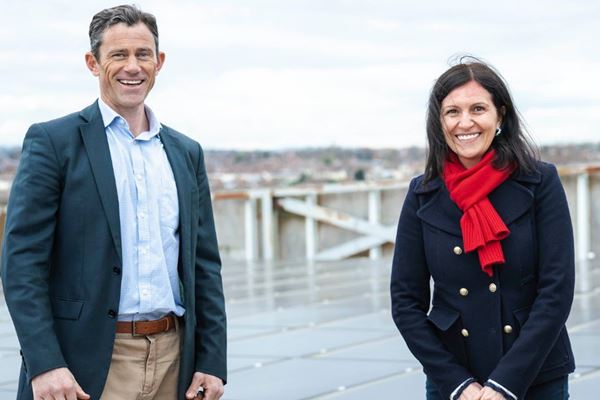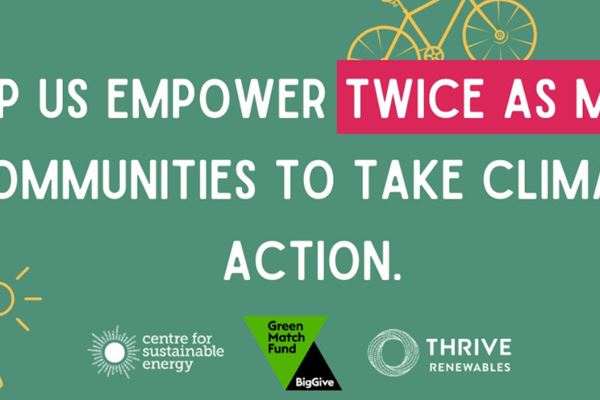As our world leaders continue to discuss how to tackle dangerous climate change, in particular the goal of limiting long-term global temperature rises to 1.5°C at COP28 in Dubai, new analysis by Friends of the Earth has found that the UK is likely to breach its commitment to the Paris Agreement.
According to the Intergovernmental Panel on Climate Change (IPCC), this 1.5°C target is critical if we’re to avoid the very worst impacts of climate change and was agreed by 196 parties at the COP21 conference in France in 2015, subsequently known as the ‘Paris Agreement’.
But under current policies, the government would only achieve just over half (54%) of the emissions cuts needed between now and 2030 to hit the target. This is made worse by the fact that the emissions gap – the difference between the target and projected emissions in 2030 – has grown by more than half (55%) over the last year[1], thanks to a scaling back on climate action – including the decision to hold annual oil & gas licencing rounds.
And its not just the UK that is falling behind. A new report from the UN Environment Programme (UNEP) confirmed that urgent action is needed, with the world currently on track for 2.5 to 2.9°C of heating this century. With temperatures soaring and episodes of extreme weather becoming more and more frequent, the UN’s secretary general, Antonio Guterres, has said that the world is heading for a “hellish” future if we don’t act now.
What do we want to see as a result of COP28?
1. A commitment to fully phase out fossil fuels
In 2016, parties attending COP26 in Glasgow agreed to “accelerate the phasedown of unabated coal power and phase-out of inefficient fossil fuel subsidies”. A year later at COP27, 80 countries called to have this language updated so that it included not only coal, but all fossil fuels. This was ultimately unsuccessful.
We’re now seeing this conversation continue to unfold, with countries allegedly considering calling for a formal phase-out of fossil fuels as part of the summit's final deal to tackle global heating[2]. The topic is certainly causing debate, however, with four times the number of oil and gas producing countries attending COP28 compared to last year’s conference. It perhaps doesn’t come as a surprise that we’re also hearing some extremely worrying statements being made about fossil fuels and their impact on climate change. It has been reported that COP President, Sultan Al Jaber, stated that there is “no science” backing up the need to phase out fossil fuels and that doing so would not allow for sustainable development, “unless you want to take the world back into caves”[3]. This comes as the latest Production Gap report has revealed that governments, in aggregate, still plan to produce more than double the amount of fossil fuels in 2030 than would be consistent with limiting warming to 1.5°C.
Put simply, there is no net zero future that includes oil and gas. What we need from our government and other world leaders is a final and binding commitment to phase out all fossil fuels, as well as faster action to reduce emissions today. We will be keeping a close eye on the negotiations and hope to see this addressed as talks come to a close next week.
2. Investment incentives for clean technologies
Ahead of the conference, the United Arab Emirates’ COP28 presidency, International Renewables Energy Agency (IRENA) and the Global Renewables Alliance issued a joint report claiming that renewable energy capacity needs to “reach more than 11,000 GW” by 2030. Following this, we’ve seen leaders from more than 110 countries commit to a collective effort to triple global renewable energy capacity by 2030[4].
This will require a massive scaling up of public and private sector investment, which presents a huge opportunity - especially in contrast to the investment which continues to flow into finite fossil fuel reserves. Here in the UK, we need to see the government urgently address the investment landscape which has not only been impacted by inflation and interest rates, but by policy uncertainty and infrastructure issues like grid connection times, amongst other things.
We know that COP28 can be a huge platform for climate action, but we need the government to recognise this and be more ambitious so that we can reassert the UK’s leadership position when it comes to clean investment. In fact, analysis by Energy UK has revealed that, without taking action to address these factors, the UK economy could lose out on £62 billion of investment between now and 2030. This would lead to a shortfall of 54 GW of potential wind and solar capacity, which represents enough generation to power every home in the UK.
3. Greater support for countries bearing the brunt of climate change
The sad truth about climate change is that it’s not a tomorrow problem, countries around the world are already facing the very real consequences of our reliance on fossil fuels, from droughts and wildfires to catastrophic flooding impacting every part of our lives, not least food production.
And a report published during COP28 has revealed that the amount of money needed for the energy transition, including climate adaptation and disaster relief, is monumental. According to the report, emerging markets and developing countries will need $2.4 trillion a year in investment to cap emissions and adapt to the challenges posed by climate change[5].
We were pleased to see the UK taking a step in the right direction, announcing a £1.6 billion climate aid package on COP28’s ‘Finance Day’, which it says has been structured to help mobilise private investment into emerging economies as a means of tackling climate change. The package includes £500 million in funding to tackle the causes of deforestation, £316 million for energy innovation projects around the world and up to £60 million for loss and damage[6].
While there are rightly questions of whether this is to distract from the scaling down of green policies at home in the UK, we agree that an ‘era of action’ is required. And it’s not just about investing in climate risk mitigation, we must keep sight of addressing the cause of climate change itself. This will cost far less and be far more efficient than having to defend ourselves against an ever increasing tide of catastrophic climate events.
As usual, COP28 has seen a number of pledges and commitments made but it will be interesting to see how these progress in the next 12 months. Instead of just talking, we’re committed to taking action: funding and building new clean energy projects that provide cleaner, cheaper power to homes across the country, while also contributing towards the UK’s net zero targets.
[1] https://friendsoftheearth.uk/climate/track-uk-breaking-its-2030-climate-promise
[2] https://www.reuters.com/business/environment/fossil-fuel-phase-out-put-table-cop28-climate-talks-2023-12-05/
[3] https://www.theguardian.com/environment/2023/dec/03/back-into-caves-cop28-president-dismisses-phase-out-of-fossil-fuels
[4] https://renews.biz/89878/global-leaders-agree-to-triple-renewables-capacity-by-2030/
[5] https://www.reuters.com/business/environment/climate-finance-takes-centre-stage-cop28-climate-talks-2023-12-04/#:~:text=The%20amount%20of%20cash%20needed,challenges%20posed%20by%20climate%20change.
[6] https://www.gov.uk/government/news/pm-to-call-for-era-of-action-at-cop28-climate-summit



